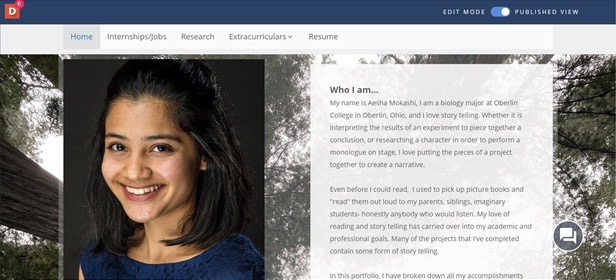Oberlin Introduces Digital Portfolios to Help Students Articulate Achievements, Goals
College third-year and SOAR leader Aesha Mokashi set up a Digication portfolio to present her academic and extracurricular work from the last three years.
This past fall the College began to incorporate Digication, an online portfolio platform, into academic concentrations and Career Development Center programs. Digication allows students to upload their work online to share with faculty and potential employers. The College hopes the move will enhance students’ learning experience and make graduates more competitive on the job market.
The College introduced Digication during this year’s Sophomore Opportunities and Academic Resources retreat, giving second-years the opportunity to reflect on their academic experiences and begin building a portfolio that they can present to prospective employers.
“We were eager to use Digication in the SOAR retreat as a tool with which sophomores could reflect on their prior learning experiences, goals, and aspirations,” said Director of Arts & Sciences Experiential Learning Curricular Initiatives Tania Boster. “Students used their portfolios to articulate the story of how and why they want to pursue their majors and other opportunities such as research or study away.”
Boster, who has worked to help introduce Digication to Oberlin, is optimistic about the platform.
“We saw the SOAR portfolio and the act of presenting that portfolio to a faculty advisor as an opportunity for students to practice consolidating and sharing a pre-professional representation of their goals and why these goals are important to them,” Boster said. “It was just as important to us that the students go through this reflective practice and articulate what brought them to declare their majors for their own development as it was for them to share this journey with a professor from their department.”
All students with an integrative concentration or interdivisional minor — whether it be in global health, business, or interdisciplinary performance — will create a Digication portfolio as part of their program requirements.
Online portfolio platforms like Digication have become more common at other colleges and universities over the course of the last decade. These platforms have a wide variety of applications from creating an opportunity for organized student reflection, to highlighting a student’s creative work, to uploading assignments for certain classes.
Boster has a grander vision for the application of the platform.
“Students can create portfolios for a variety of purposes, such as applying for internships and jobs, developing projects with collaborators in an ExCo or student organization, pitching a research project to a prospective mentor,” she said. “There really are infinite possibilities. We hope this will be the first of many portfolios students create in their Digication accounts.”
Many students who have had the opportunity to use Digication have had a pleasant experience with it.
“It is relatively adaptable and it lets you put a lot of mediums on there,” College fourth-year Tori Fisher said. “It’s an opportunity to humanize the applicants, or humanize yourself if you’re applying for something.”
Third-year SOAR leader Aesha Mokashi helped second-years set up their Digication profiles this winter during SOAR and spoke to some of the benefits of the Digication platform.
“As someone about to apply for grad school, having a space where I can organize my accomplishments in a creative way is very helpful, especially as I start to think about my personal statement and the interviews I’ll have to do,” Mokashi wrote in a statement to the Review. “During SOAR, they really focused on having the students create a narrative out of their accomplishments, which, in my opinion, is more effective than simply putting things on a resume. It allows students to really think about why they’re passionate about the things they’re passionate about, and how they can bring those passions into their degree and the rest of their time at Oberlin.”
Still, according to Mokashi, learning how to use Digication posed a challenge to some SOAR participants.
“I do think some of the students struggled with the platform in SOAR, and I think it’s because Digication was pretty unfamiliar to them at the time,” Mokashi wrote. “That’s why I’m interested to see how they’ll introduce the platform to the rest of the school. I know that the school wants to start the integration process early, which is one of the reasons they’re having PALs use Digication with admitted students in the Healing Democracy course.”
Fisher was also optimistic about fellow students’ reactions to the platform.
“It depends on the department,” Fisher said. “If you’re in STEM you might not find it helpful, but if you’re in areas where they focus more creatively or writing or art, you’ll probably react positively to it.”
Boster is hopeful that the platform will help students articulate and showcase their academic, professional, and creative growth.
“Students’ Digication accounts will go with them when they graduate, so it can become an archive for one’s thinking and development of ideas over time,” Boster said.
Digication is currently available to all Oberlin students.







